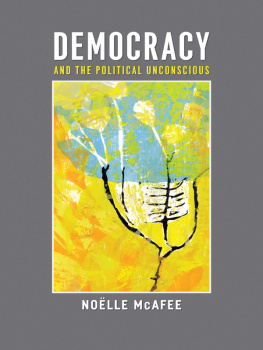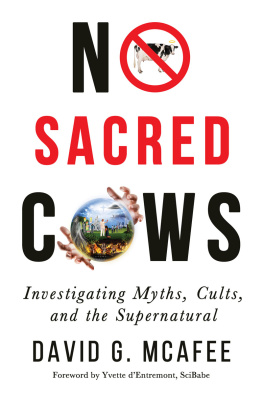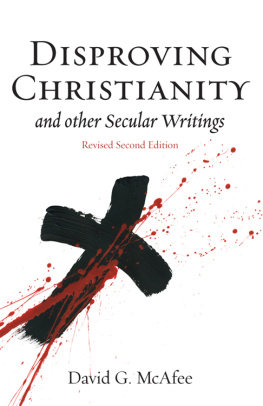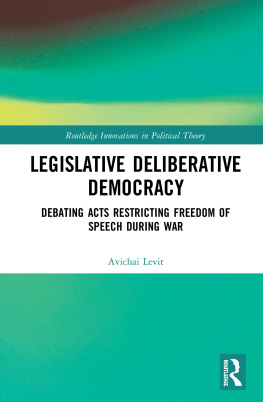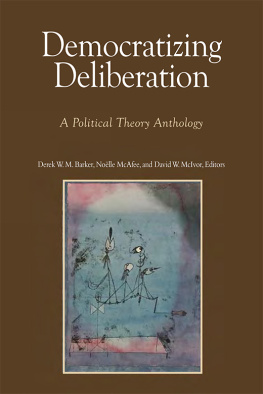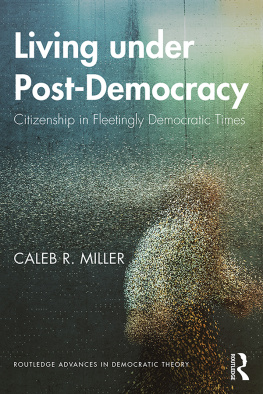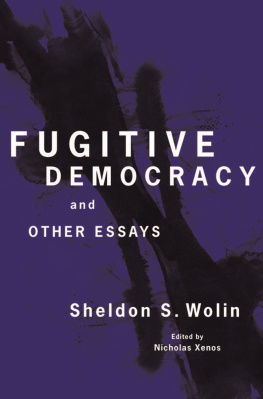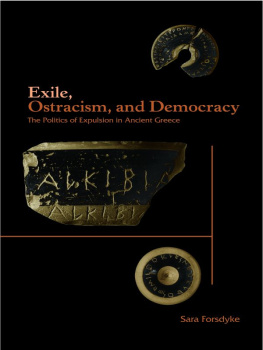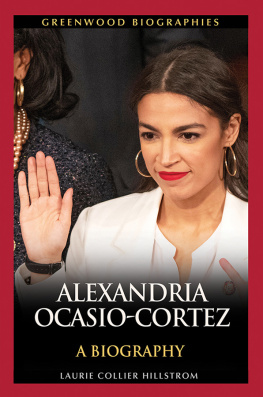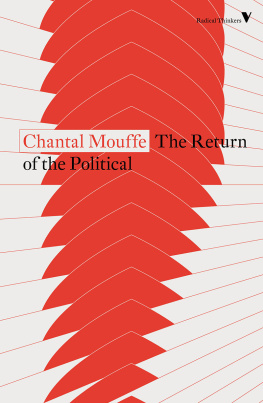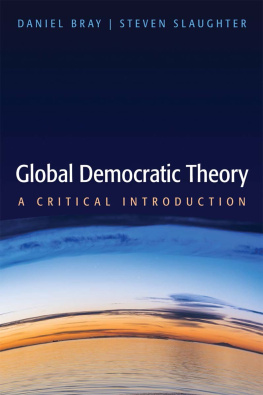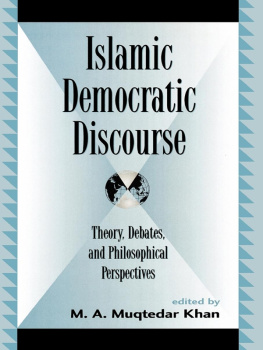Democracy and the Political Unconscious
New Directions in Critical Theory
AMY ALLEN, GENERAL EDITOR
New Directions in Critical Theory presents outstanding classic and contemporary texts in the tradition of critical social theory, broadly construed. The series aims to renew and advance the program of critical social theory, with a particular focus on theorizing contemporary struggles around gender, race, sexuality, class, and globalization and their complex interconnections.
Narrating Evil: A Postmetaphysical Theory of Reflective Judgment, MARA PA LARA
The Politics of Our Selves: Power, Autonomy, and Gender in Contemporary Critical Theory, AMY ALLEN
The Force of the Example: Explorations in the Paradigm of Judgment, ALESSANDRO FERRARA
DEMOCRACY AND THE POLITICAL UNCONSCIOUS
Nolle McAfee
Columbia University Press New York
Columbia University Press
Publishers Since 1893
New York Chichester, West Sussex
cup.columbia.edu.
Copyright 2008 Columbia University Press
All rights reserved
E-ISBN 978-0-231-51112-4
Library of Congress Cataloging-in-Publication Data
McAfee, Nolle, 1960
Democracy and the political unconscious / Nolle McAfee.
p. cm.(New directions in critical theory)
Includes bibliographical references and index.
ISBN 978-0-231-13880-2 (cloth : alk. paper)
1. Democratization. 2. Democracy. 3. Political sciencePhilosophy. 4. Political psychology. 5. Critical theory. 6. FeminismPolitical aspects.
I. Title. II. Series.
JC423.M38334 2008
321.8dc22 2007025259
A Columbia University Press E-book. CUP would be pleased to hear about your reading experience with this e-book at .
CONTENTS
I have several debts to acknowledge. This book took shape with the support of my editor at Columbia University Press, Wendy Lochner, the kind of editor one dreams of: smart, ethical, creative, supportive, available, an ally, a friend, and a wonderful dinner companion. For helping get this book in better shape, I am grateful to Cynthia Willett and Vincent Colapietro, especially for their careful reading of drafts of the manuscript and suggestions for how to improve it. Also, for helping see this book into press, I thank other editors at Columbia University Press, including Christine Mortlock for overseeing logistics and Leslie Kriesel for her superb editing.
John Stuhr has been a great friend and colleague in thinking about how American pragmatism and continental philosophy intersect with contemporary political problems. Kelly Oliver not only guided me through a dissertation a decade ago but also continues to stimulate my thinking about psychoanalysis and politics. Her work on sublimation especially nurtured this book. My sensibilities about democracy were shaped through twenty years of conversations with my dear friend, David Mathews, the president of the Charles F. Kettering Foundation, as well as other Kettering colleagues, namely Bob Kingston and John Dedrick. Also through Kettering and its larger circles, I have learned much from other thinkers who care deeply about democracy, including David Brown, Harry Boyte, the late Cole Campbell, Rich Harwood, Alison Kadlec, Peter Levine, Scott Peters, Harold Saunders, Randa Slim, Claire Snyder, Maxine Thomas, and Debi Witte. This project got started thanks to a Joseph P. Healey Endowment Research Grant from the University of Massachusetts Lowell, which provided funding for a visit to the International Center for Transitional Justice, where I benefited from initial advice from Pablo de Greiff. I thank my colleagues in the philosophy departments at the University of Massachusetts Lowell and George Mason University for their support and ideas for this project, especially Debra Bergoffen, Rose Cherubin, Wayne Froman, Martin de Nys, Robert Innis, Daniel Rothbart, and P. Christopher Smith. I also thank Katherine Arens who, a decade ago at my doctoral dissertation defense, made some comments about Kristeva and public space and Elaine Scarrys work, ideas that I did nothing with at the time but that must have been at work subconsciously when I embarked on this projection. I think this book is something like what she had in mind. I am also grateful to Fredric Jameson for his guidance when I was at Duke and for the ideas sparked by the title of his book, The Political Unconscious.
Patricia Aufderheide and the Ford Foundation provided a time for me at American University to work on public media and democracy. Through that venue I also came to know and learn from Barbara Abrash, Orlando Bagwell, Robert Lavelle, Martin Lucas, Rebecca Mackinnon, Karen Menichelli, and Ellen Schneider. Sharon Meagher shares my passion for public philosophy. I also thank the Society for the Advancement of American Philosophy, the Society for Phenomenology and Existential Philosophy, the Western Political Science Association, the Seminar in the Human Sciences at George Washington University, and the Institute for Philosophy and Public Policy at the University of Maryland for opportunities to present earlier versions of this work. I also thank my dear friends, Linda Hesh, Leslie Milofsky, Beth Myler, Ann Carr, Paige Totaro, Vero Autphenne, and Kelly Valceanu, and my family, Erin, Paul, and Marika McAfee and Eliza, Guthrie, and David Armstrong, for helping me fathom what is at stake in the subject of this book.
I have been working out the ending of this book for the past few years, with much of it published as separate articles. Part of first appeared in the Kettering Review 24, no. 1 (Spring 2006): 5868.
The first part of this book sets up the challenge to which all these later chapters respond. I am grateful for the opportunity to pull this material together into a larger argument and, I hope, a persuasive case for why in times of trouble we need to talk.
This book aims to make sense of a pathology unleashed on September 11, 2001a pathology that had certainly been at work for millennia but now became a more overt threat to peoples around the world. Bizarrely, one of the weapons this pathology wielded was democracy, not the real thing but an ersatz form in the guise of democratization, a process of repetition that is anything but democratic. For their sake, we invade a peoples homeland and root out enemies of democracy, people who hate our freedoms. The events of September 11 have many old and tangled roots, but one of the more recent ones was the end of the Cold War, when instead of two superpowers that put a hold on internecine ethnic tensions we had one superpower that maintained its position by being the bully on the block, in the words of Colin Powell, even if that meant taking sides in, and hence adding fuel to, ethnic and religious conflicts, with the purported aim of democratization. Instead of pausing after 9/11 to try to untangle the roots of the conflict, to use the real tools of true democracypublic talk and collective decision making and bridge buildingthe United States set in motion an endless war on terror, a repetition compulsion that unveiled other repetition compulsions. Note this one, as reported by the BBC, of Saddam Husseins last moments:
Dressed in a white shirt and dark suit and overcoat, he was handcuffed with his hands in front of him and carried a copy of the Koran in his hands, which he asked to be given to a friend.
A judge then read out the death sentence.
Judge Haddad described what happened next:
One of the guards present asked Saddam Hussein whether he was afraid of dying.
Saddams reply was that I spent my whole life fighting the infidels and the intruders, and another guard asked him: Why did you destroy Iraq and destroy us? You starved us and you allowed the Americans to occupy us.

